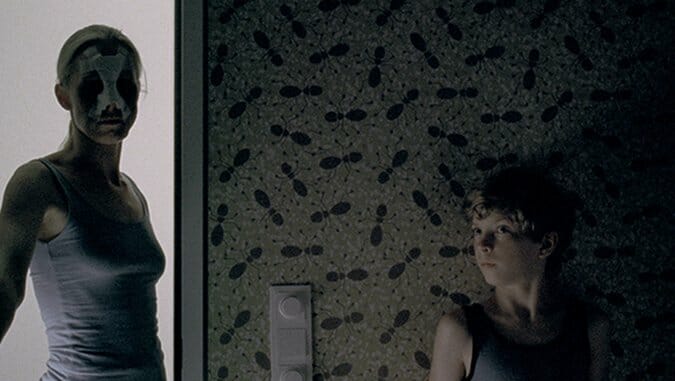Goodnight Mommy

There is a twist at the core of Goodnight Mommy, but its revelation isn’t so much surprising as it is a confirmation of the depths of psychological depravity the filmmakers have only hinted at during the film’s preceding 90+ minutes. To be sure, the debut of Austrian directors Veronika Franz and Severin Fiala is a horror film down to its sinew—treading in classic tropes, from creepy twins in creepy masks to creepy crawlies our only company in marrow-cold isolation, Goodnight Mommy still seems to set its sights on more psychological thriller territory, but by the time that finale (that twist) unveils its disturbing details, the strictures of genre hardly matter in light of the darkness at the film’s heart.
We begin by joining twin, tow-headed nine-year-old brothers Lukas (Lukas Schwarz) and Elias (Elias Schwarz) as they explore the rural paradise of their new home, swimming in azure-pure lakes and casually spelunking through nearby caves ostensibly untouched for centuries. Though the twins seem to be perfectly content letting their Edenic nature occupy them, a near-ineffable pall of tragedy hangs over the film from the start. It’s unexplainable but slightly pungent, as if at any moment one of the boys will fall down a ravine or stumble into a hornet’s nest. Maybe it’s because they bow to seemingly no adult supervision—that is, until their mother (Susanne Wuest) returns to their ceaselessly modern home after going away for a surgery of some sort. Her face covered in bandages, her eyes red-rimmed and limned with a shadow of dread, “Mommy” greets her boys with reticence and anxiety. We learn that she’s a popular news anchor, and that her surgery is most likely cosmetic, but in the film’s perspective—which is the boys’—she seems too shrouded in mystery to be the person, the parent, Lukas and Elias remember so dearly.
Gradually, of course, the boys suspect that something is up with their mommy, especially when, as a form of punishment for their suspicious behavior (as well as, we assume, behavior and transgressions we have yet to understand), she pretends that Lukas doesn’t exist. She overtly argues with Elias, right in front of his brother, that Lukas should be ignored—going so far as to only serve Elias dinner or only lay out Elias’s clothes for the following day. This addled attitude on their formerly loving mother’s part encourages the boys to investigate, sneaking around their sterile estate, surreptitiously watching their caretaker in between flagrant bouts of childish excess, running out to frolic in the rain, say, or collecting cockroaches to raise en masse in the terrarium in their bedroom. They’re young boys, after all: their obsession with bugs is fueled by both abhorrence and a fascination in the unseen world—as it would be for any prepubescent boy. They even have ants festooning their bedroom’s wallpaper, their walls adorned with a design amounting to a playful, unfinished M.C. Escher tessellation.
Like a lobotomized Wes Anderson, Franz and Fiala are directors addicted to the precision of symmetry, photographing the boys’ supposedly idyllic home by framing each shot in the stark whites and sharp corners of affluence. As openly modern as it is impersonal, Goodnight Mommy’s setting is—without sounding too trite—as much of a character as its three humans, balancing notions of safety and prosperity with tidings of something sinister, something almost preternaturally unspoken, underneath its mannered veneer. In that, this new house represents the maternal nature the boys sense slipping from their actual mother, and the more the filmmakers allow us to better familiarize ourselves with this pastoral locale, the stranger and more imposing it becomes—less isolated from the ills of society than stranded apart from the safety of society’s womb.
-

-

-

-

-

-

-

-

-

-

-

-

-

-

-

-

-

-

-

-

-

-

-

-

-

-

-

-

-

-

-

-

-

-

-

-

-

-

-

-








































